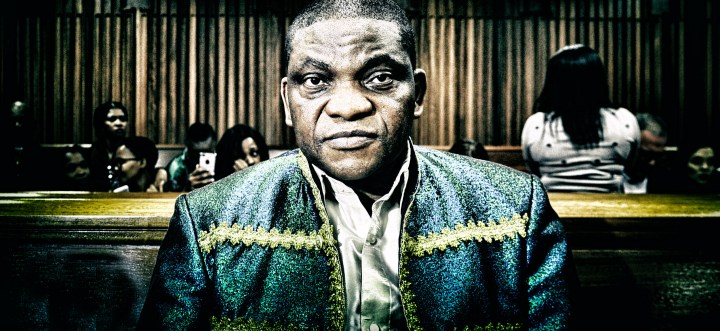THE CLOTH AND THE RAPE
Omotoso abuse raises case for regulating religion

Cheryl Zondi defiantly challenged her rape accuser this week. A Chapter Nine institution said it shouldn’t have happened, and must never happen again. But Parliament won’t listen to the complaints.
Cheryl Zondi’s testimony in the rape case against charismatic televangelist Timothy Omotoso at the Port Elizabeth High Court was broadcast live. The 22-year-old was on the stand for three days and under cross-examination was repeatedly asked to elaborate on the lurid details of her alleged sexual assault.
Zondi’s resilience under intense scrutiny from Omotoso’s defence lawyer, Advocate Peter Daubermann, won her supporters across the country. As she testified about the alleged abuses that started when she was 14 years old, Omotoso, the popular preacher who faces 63 charges, including rape, sexual assault and racketeering, watched on, either ambivalent or jovial.
It was too late for her to have been saved by the proposals on regulating religious organisations presented to Parliament in 2017. But the Commission for the Promotion and Protection of the Rights of Cultural Religious and Linguistic Communities (CLR) believes stricter regulations for religious bodies could prevent other children from suffering the same fate.
CLR CEO Edward Mafadza said the Chapter Nine institution’s proposals would avoid a situation where religious organisations and their powerful leaders, such as Nigerian-national “Prophet” Omotoso’s Jesus Dominion International Church, have the leeway to take advantage of their congregants’ faith.
“It wouldn’t be an island in terms of his own operation,” said Mafadza on Thursday, commenting on Omotoso.
He said the CLR’s proposals to Parliament, which were rejected, would ensure churches like Omotoso’s are scrutinised and regulated by their local peers and could not act with such impunity.
In 2017, the CLR submitted its “Report on the Hearings on Commercialisation of Religion and Abuse of People’s Belief Systems” to the portfolio committee on co-operative governance in Parliament.
The report didn’t touch specifically on sexual violence, but responded to stories of religious leaders, Christians in particular, who had been spraying church members with Doom insect repellant, making them eat grass, or doing weird things with snakes, and taking their hard-earned savings to enrich a charismatic leader.
The CLR said Parliament must enact laws to regulate religious practices. It proposed a system of self-regulation where each organisation is registered and structures are established at each level of the sects of different religions so they can hold one another accountable.
Omotoso allegedly starting grooming and abusing young female members of his church years ago, but Mafadza said while the proposed regulations could not help every victim, they might in future create a network of churches defined by self-regulation that could have exposed the abuses earlier.
Parts of the Christian community vehemently opposed the CLR’s recommendations on regulating religion and the parliamentary committee did not endorse the institution’s findings, instead recommending a national summit be held on the way forward in dealing with those who clearly abuse faith.
The CLR’s recommended regulations gained prominence early in 2019 after the deadly attacks by leaders of the Seven Angels Ministry in the Eastern Cape. The CLR warned Parliament about the risks, and no one listened.
“This could have been avoided. We told them we cannot have a sector that is not regulated,” said CLR Commissioner Thoko Mkhwanazi-Xaluva at the time.
“When you are in a holy environment, you believe that everyone wants to do the right thing… but, because of the setting, you might not be able to say: ‘No, this is wrong’,” she was reported to have said later.
After the CLR’s proposals on regulating churches were rejected by Parliament, the institution said it would go to the Constitutional Court to have its powers defined. On Thursday, Mafadza said the CLR was still weighing up its legal arguments and whether, as the lowest funded Chapter Nine institution, it could afford the costs.
Some Christian religious institutions believe the proposals on regulating churches violate their freedom of belief and would not prevent abuse, such as Zondi suffered, from happening.
“I don’t know if regulation prevents people from doing illegal things,” said Michael Swain, executive director of Freedom of Religion in South Africa (Forsa).
“Sexual abuse is sexual abuse. It’s a crime,” said Swain, who condemned Omotoso for facing the allegations he faces, but said the authorities must act against crime and regulating religion isn’t the answer.
Swain has written extensively on how such abuses must be dealt with by the authorities and how the proposed system of regulation, which the CLR would have ultimate control over, violates the rights to religious freedom.
Swain and Forsa have detailed their complaints against the CLR recommendations. Regulating the industry violates the right of freedom to choose a religion, they say. Forsa has also complained about the process leading the the CLR’s recommendations.
Swain in fact sites the Omotoso case as a success – he’s facing charges, the criminal justice system is working, although it should work better and has its faults. But it shows there are other more effective ways to save the vulnerable from church abuses.
But abuses have occurred and are probably continuing right now. The CLR’s modest proposals might help, but others suffering are from the same fate, and Parliament and the authorities are too scared to act. DM

















 Become an Insider
Become an Insider